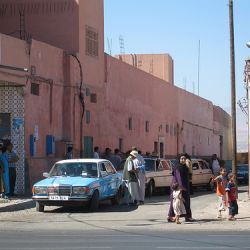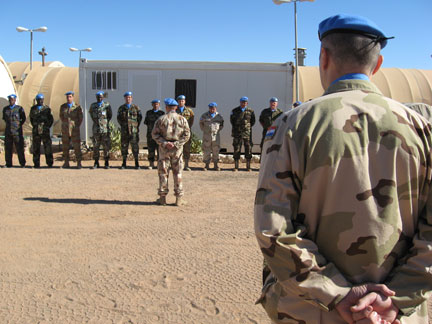 The decision was reflected in the ‘Common Foreign Policy Platform’ agreed upon by the three parties for the forthcoming elections’ campaign.
The decision was reflected in the ‘Common Foreign Policy Platform’ agreed upon by the three parties for the forthcoming elections’ campaign.
Recognition supporters
The Congress was held in the city of Gavle from the 7th to 9th of May 2010 and to which a Polisario delegation led by the representative to Sweden was invited.
The Polisario delegation met with the International Secretary of the Party and heads of several foreign delegations participating to the Congress, mainly South Africa, Burkina Faso, Norway, Denmark, Bolivia and Finland.
It is to be recalled that during the May 1st demonstration and during the three days of the Congress, a campaign for fund raising for the Saharawi people was organised.
2010 elections will decide?
The party congress of the Swedish Social Democratic Party in November 2009 demanded that Sweden recognise Moroccan-occupied Western Sahara as the first country in Europe. The party will demand a Swedish recognition of Western Sahara should the party win the  coming 2010 elections.
coming 2010 elections.
After a debate the party congress decided that if they are elected to government, they will recognise the Sahrawi Arab Democratic Republic (SADR) and work for a recognition within the EU.
Sahrawi Deputy Minister of European Affairs Mohamed Sidati, who was invited to speak at the Swedish party congress, also strongly welcomed the decision. “This initiative, in addition to being a bold action in favour of the struggling Sahrawi people, represents an important opportunity for the Sahwari cause in Sweden and Europe.”
Swedish diplomat expelled from Morocco in 2009
After a few days, Morocco ordered the immediate departure of a Swedish diplomat accused of cooperation with Western Sahara-linked “separatists”.
Foreign Minister Taieb Fassi Fihri summoned Swedish ambassador Michael Odevald to tell him of “a serious breach in diplomatic practice and an unacceptable professional error committed by an advisor at Sweden’s embassy in Rabat, Mrs Anna Block-Mazoyer,” a statement said.
Block-Mazoyer “gave an official document that was given by the foreign and cooperation ministry to the Swedish embassy in Rabat as part of a diplomatic process to separatist elements linked to Algeria and the Polisario Front.”
“This document then turned up in the hands of enemies of the kingdom’s territorial integrity,” it said.
The statement said that the foreign ministry had organised a briefing on Sahara developments to which diplomats were  invited, including from Sweden which at the moment held the rotating European Union presidency.
invited, including from Sweden which at the moment held the rotating European Union presidency.
Background
Western Sahara has been on the United Nations list of non-self-governing territories since the 1960s when it was a Spanish colony. The Kingdom of Morocco and the Polisario Front independence movement, with its Sahrawi SADR government, dispute control of the territory. Since a United Nations-sponsored ceasefire agreement in 1991, most of the territory has been controlled by Morocco, and the remainder by the Polisario/SADR. The Polisario Front wants a referendum on self-determination, with independence as one of the options.
Polisario has won formal recognition for SADR from 81 states, and was extended membership in the African Union, while Morocco has won recognition for its position from the Arab League. In both instances, recognitions have over the past two decades been extended and withdrawn according to changing international trends.
A majority of African states have recognised the SADR. Further, many Latin American countries and some Asian countries have recognised Western Sahara.
No European country so far has recognised SADR as an independent state. On the other hand, no country has accepted Morocco’s territorial expansion either. Several political parties in Western and Northern Europe are currently working for a recognition of SADR by their countries’ governments.
MINURSO
The important role in the Western Sahara plays MINURSO (The United Nations Mission for the Referendum in Western Sahara). It was established by Security Council in 1991 in accordance with settlement proposals by Morocco and Polisario.
MINURSO was originally mandated to monitor the ceasefire, verify the reduction of Moroccan troops in the Territory, identify and register qualified voters for referendum, etc. While the organisation of the referendum has not been possible to date, other requirements of the mandate have been pursued. Now MINURSO monitors the ceasefire, reduces the threat of mines and UXOs, supports the confidence building measures.
In April 2010 the President of Western Sahara, Mohammed Abdelaziz, has strongly critized the UN peacekeeping mission MINURSO for not working to organize referendum and for paying little attention to Moroccan human rights violations against Sahrawis in Western Sahara.
Polisario has recently invited the UN to monitor the human rights situation in the small part of the territory under its control and in the Algeria-based refugee camps where the exiled Western Sahara government is housed.
***
From 1998 to 2006, Vänsterpartiet was in an arrangement with the ruling Social Democrats and the Greens and until 2006 supported the Social Democratic minority government in the Swedish parliament, as well as in many of Sweden’s counties and municipalities.
Related links:
Sahrawis dissatisfied with UN chief and peacekeeping mission MINURSO
Polisario Front calls on UN to supervise human rights in territories under its control
Western Saharan hunger strikers – Morocco’s human rights violations


